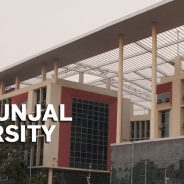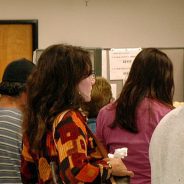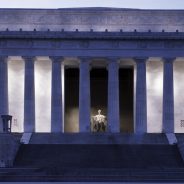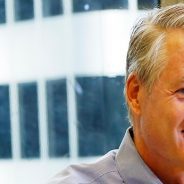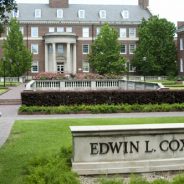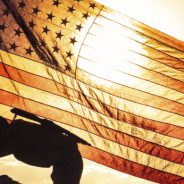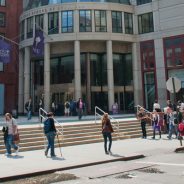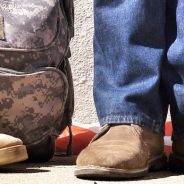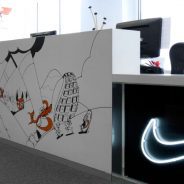Search results for :
Jones School’s Veterans in Business Association Aids MBA Transition
The Rice University—Jones Graduate School of Business (Rice Business) recently highlighted its Veterans in Business Association (VIBA)—a unique student club that works to increase the number of veterans in Rice Business’s MBA program and bring a national awareness to their efforts—as part of a feature article in Rice Magazine.
VIBA was founded in 2011 by former Navy SEAL James Battista, who served for a decade in the military. The student organization aimed to provide mentoring opportunities for students making the challenging transition from military life to academia.
The following year, Rice Business dean Bill Glick, along with Rice trustees and others from the leadership team, began a scholarship that would help cover the cost of tuition, fees and living expenses for one veteran earning his or her MBA degree. This year, the recipient is Major William E. Lyles, a first-year MBA student at Rice Business who lost both of his legs after stepping on a buried improvised explosive device (IED) in Afghanistan. And while the transition from military to civilian life has not been an easy one for Lyle—including four years of rehab at the Brooke Army Medical Center in San Antonio—he nonetheless finds some overlap in the skills used in the Army and in an MBA.
“I wish I was still able to do what I did, but this is good, too.” Lyle told Rice Magazine. “I’m going to get a chance to lead again, in a different capacity.”
At Rice Business, special care is taken to consider the specific challenges facing veteran applicants. Annie Hunnel, Rice Business associate director of recruiting and admissions, travels across the nation to meet with potential students and help them understand how to transfer their military experience to the professional world.
With such an important focus placed on addressing the challenges of military applicants, Rice Business has quickly gained a reputation as one of the top veteran-friendly business schools in the country. “Rice valued my background in the military, and when I came down and got to meet some of the supporters, that clinched it,” former Green Beret Steve Panagiotou told Rice Magazine. “The support was almost overwhelming from alumni who have been successful in their careers. At that point it was a no-brainer for me.”
To read the complete Rice Magazine article, “The Next Mission,” click here.
Los Angeles MBA Programs without GMAT/GRE Requirements
Applying for an MBA program is an involved process. You have to fill out the application, write essays, ace an interview, develop a “killer” resume, and ask for stellar letters of recommendation. It’s a more involved process than any job application or interview and how well you do can affect your life and job prospects for years to come. Worse yet, most programs also require the GMAT or GRE, increasing your workload and stress exponentially. Continue reading…
Over 90% of India’s MBA graduates are “unemployable,” according to report
The Federation of Indian Chambers of Commerce and Industry (FICCI) in partnership with Ernst & Young has released a damning report about the current state of affairs regarding Indian MBA and engineering graduates.
The Higher Education Summit report states that nearly 93 percent of Indian MBA grads are “unemployable.” That was also true for engineering grads, at nearly 80 percent.
The greatest deviation in why so many recent Indian graduates may not be ready for careers in MBA and engineering is a pronounced skill-gap, according to the report. Many of the six million annual graduating students in the fields earn degrees from a wide-array of institutions, some of which can be considered significantly more substantial than others as well.
“According to the observations made in the report, the outdated curriculum being taught to students adds up to the skill-gap,” writes DNAIndia. “Inadequate infrastructure and poor quality of faculty, combined with old delivery platforms, make it difficult to equip students with relevant skills, it adds.”
In addition to the issues of teaching and infrastructure, another problem with recent MBA and engineering grads may be the excessive saturation of institutions which award the degrees in the country.
According to Sunaina Mattoo Khanna, chief people officer and head of transformation at Bajaj Capital, “The numbers are quite alarming and the credit for this goes to all the local institutes which have mushroomed in every nook and corner of India, certifying students as MBAs and engineers. It hardly matters what degree people have in hand but the point that matters is that they have to be ‘employable’ and future trainable.”
“We ourselves are surprised that many candidates with MBA degrees from these small institutes fail miserably in general aptitude or IQ tests,” Khanna continues. “Even questions like what are the highest slabs of tax etc. are not known to them. Other factors include, students who have a vision of self-employment and remain unemployed for a longer time because of rising capital, discussing business plans etc.”
While the figures are, in a word, dire, there is hope that schools are beginning to more properly diagnose the issues now.
BML Munjal University in Kapariwas has a Centre Of Excellence that teaches students invaluable soft-skills, which are vital in overcoming hurdles in the business world.
Read the entire report at the official FICCI website.
Top 5 Finance MBAs in New York City
Wall Street anchors the economy of New York City, and much of the U.S. So, it’s no wonder that it’s considered the world’s premier financial center. It’s home to the New York Stock Exchange, NASDAQ and more prominent financial institutions. Plus, Manhattan is a leading center of banking, finance and communication. In fact, financial services account for more than 35 messages of the city’s employment income.
That’s why it makes sense to get a finance MBA in New York City. There’s no better location to dive into the industry and all of its many facets, but which MBA program is the best? Of course, every school offers courses in finance, but there are a few schools that stand out.
Below, we’ve outlined the five best finance MBAs and why they stand out.
Stern School of Business – New York University
At the Stern School of Business, the finance department is home to world-renowned faculty, including Professor Robert Engle, the 2003 Nobel Prize winner in economics. And those professors are in charge of teaching a variety of finance courses for the MBA program. What makes Stern stand out is the myriad of finance specializations available to students. Unlike most programs, which offer a single finance concentration, Stern breaks it down into unique specializations:
- Banking
- Corporate Finance
- Finance
- Financial Instruments and Markets
- Financial Systems and Analytics
- FinTech
- Quantitative Finance
The courses that make up the specializations include everything from bankruptcy and reorganization to behavioral finance, valuation and financial information systems.
Outside of the classroom, Stern offers students an opportunity to join the Graduate Finance Association, and to participate in the Center for Real Estate Finance Research. And thanks to their focus on finance, 5 percent of MBA graduates enter the diversified financial services industry and 24 percent enter investment banking.
Columbia Business School
MBAs at the Columbia Business School can easily and effectively focus their career path in finance. The finance program includes such courses as asset management, investment banking and risk management. Outside of the classroom, the school offers students seven different programs and centers dealing with finance and economics. The most interesting programs include:
- Private Equity Program: The program serves as the business school’s primary point of contact with the private equity industry.
- Heilbrunn Centre for Graham & Dodd Investing: The center promotes the practice and study of original investing principles, to improve investing with a world-class education and research.
And it’s obvious that the finance MBA works at Columbia. In 2015, 15 percent of graduates went into finance: investment management, 14 percent went into finance: banking, and another 14 percent went into finance: other.
Gabelli School of Business – Fordham University
The finance MBA at the Gabelli School is a standout program. The concentration includes eight courses on finance including hedge funds, equity analysis and emerging markets. But it’s not just the concentration that makes Gabelli a good choice. It’s also the MBA Immersion Week experience, which allows students to spend five days immersed in the inner workings of the finance industry.
Outside of the program, students can participate in the Fordham Finance Society, which is student-run and provides a diverse range of events, speakers and resources in finance. As part of the society, the school offers a variety of challenges and events for graduate students including the University Trading Challenge.
Zicklin School of Business – Baruch College
At the Zicklin School, the MBA in finance is a major that covers a broad range of careers in the financial industry. There are dozens of courses that students can choose from, and 12 credits are required to complete the major. An example of possible courses include futures and forward markets, advanced managerial finance and measurement and management of credit risk.
The school is also home to the Subotnick Financial Services Center, which is a state-of-the-art instructional facility that provides hands-on finance practice. And the crowning achievement of the Center is the Wasserman Trading Floor. This floor includes 55 high-end workstations and high-tech financial tools that can be used for experiential learning experiences.
Zarb School of Business – Hofstra University
The finance MBA at the Zarb School is dedicated to helping MBAs achieve a career in the financial services industry. The degree requires 41-48 semester hours to complete and includes courses such as managerial finance, investments and advanced quantitative analysis for managers.
MBAs at Zarb also have the opportunity to use The Center for International Financial Services and Markets. To help students on their career path, the center regularly hosts conferences and workshops as well as offering resources for faculty and student study. There’s also the Financial Management Association, Graduate Finance Association and the Hofstra Investment Banking Association, which offer additional finance guidance and experience.
Top 5 Entrepreneurship MBAs in London
Over the past few years, London has become one of the most well-known, influential and successful startup hubs in the world. And it makes sense. London has always been the largest financial center in Europe, and it has a history of cultural innovation. Plus, 75 percent of the top 500 global companies are based in London.
That said the London startup scene is unique. At its core, it’s all about diversity. In a city of 8.6 million people, there’s an incredible opportunity for cross-fertilization of ideas from all over the world and from a diverse array of networks. And that’s why so many startup incubators and accelerators are popping up all over the city.
The city is ripe for entrepreneurship, but what about for budding entrepreneurs? That’s where schools such as the London Business School, Cass Business School and Judge Business School come into play. They and many others offer exceptional MBA programs focused on developing entrepreneurs.
So, which London entrepreneurship MBAs are the best? We’ve outlined the top five programs. Continue reading…
Graziadio Dean on the Future of the Job Market
Dean David Smith of Pepperdine University’s Graziadio School of Management recently wrote a piece for the LA Daily News on the state of California’s most recent unemployment rate.
In a guest commentary, Smith addressed the state’s 4.9 percent jobless number, which, while markedly lower than last year’s figure, is still cause for close attention by recent grads.
Washington DC MBA Programs without GMAT/GRE Requirements
Remember that stress felt taking the SATs? It’s hard to forget the countless hours spent preparing for the test, only to forget what was studied shortly thereafter. Ah, the good ol’ days.
Fast forward to business school, and we’re talking GMAT and GRE. Now that the stakes are even higher, knowing that one test could have a significant impact on one’s education can make them feel like they’re in a pressure cooker. Continue reading…
Former eBay CEO Talks Work-Life Balance at Stanford
Stanford’s Graduate School of Business recently published an article about a keynote lecture from retired eBay and Bain CEO John Donahoe ’86 presented.
SMU Cox Full-Time MBA Rises in Global Ranking
The Southern Methodist University—Cox School of Business recently rose several points in a ranking of top full-time MBA programs in the world, ranking 66th overall.
Cameron Alumni Give Mentorship, Opportunities for Students
With a robust alumni network, graduates from the University of St. Thomas—Cameron School of Business have come together on the CSB Alumni Board to share their expertise with current students.
The Best Business Schools For NYC Veterans
The transition from boot camp to business school need not be such a leap for veterans of the U.S. Armed Forces. There are a number of MBA scholarships in place specifically designed to help relieve and in certain cases absolve the financial burden of business school tuition for veterans.
The Best Business Schools for Philadelphia Veterans
Veterans are no strangers to challenge–particularly those who have decided to pursue their MBAs in today’s highly competitive job market. Vets, many of whom face the difficulties of making the transition back into civilian society after their military service, are fortunate to have the support of highly specialized programs in some of the country’s top business schools.
The Philadelphia metro has some exemplary programs for former service men and women. Here is a closer look at several of them.
NYU Stern Announces New Veterans Scholarship Program
Brothers Lorenzo and Frank III Fertitta, sons of retired casino magnate Frank Fetitta Jr., have recently gifted the NYU Stern School of Business with a generous $15 million endowment for the newly established Fertitta Veterans Program.
The donation will assist the full-time acceptance of around 20 military veterans looking to pursue an MBA, reducing tuition to a flat $30,000 per year. The current tuition rate for the NYU Stern MBA program is just above $66,000 per year.
Speaking with NYU Stern, MBA student Samantha Sarkis says, “Business school is a huge financial investment and an even bigger one when attending one in NYC because the cost of living is almost as much as your tuition. When considering what schools to attend, I weighed out the opportunity costs of the school brand, location, opportunities and tuition. While researching schools, NYU was the only school that offered a non-9/11 GI Bill scholarship, which was extremely appealing given the strength of its brand, location and unique opportunities of living in NYC.”
The program will not only provide a significantly reduced tuition rate, but will also provide courses to spearhead MBA students into their future business careers.
Isser Gallogly, the associate dean of MBA admissions and program innovation, says, “Students will participate in a six-week summer term during which they earn six credits and participate in a variety of academic, leadership and career development activities. Students will take the core course statistics and data analysis, as well as accounting.”
The effort to naturally integrate returning military veterans is not just limited to the school, says Raghu Sundaram, vice dean of MBA programs.
“A part of it is professional: connecting them to alumni who are themselves veterans and who can act as mentors, assisting in this transition process and to corporations who hold special events for veterans,” Sundaram says. “And a part of it is social, allowing them to bond with each other even as they get to know the school and the city.”
The scholarship will officially go into effect in 2017.
The Fertitta brothers both work in the casino and sports entertainment industry. Frank III, who earned a BA/BS from the USC Marshall School of Business, is the current CEO of Station Casinos, which was originally founded by his father. He is also a part-owner of Zuffa LLC, the company that owns the UFC, of which Lorenzo works for. Lorenzo graduated with an MBA from NYU Stern in 1993.
Click here for more information on the NYU Stern Fertitta Veterans Program.
MBA Programs That Don’t Require Work Experience: San Francisco
Not everyone comes from a traditional working background earns an MBA for the same reason. So, in the same ways that some MBA programs don’t require the GRE or GMAT score for their applications, many business schools are also willing to consider applicants with limited or no prior professional experience. Continue reading…
The Best Business Schools for San Diego Veterans
Home to the third largest concentration of veterans in the country, San Diego is an ideal stopping place for military personnel. In fact, each year, around 15,000 sailors and Marines stationed in San Diego leave the service, according to the Voice of San Diego. So, it’s no wonder that programs, organizations and services dedicated to helping them readjust to civilian life are essential. And there’s no doubt that education is one of the vital pieces.
In honor of Veteran’s Day on Nov. 11, we researched San Diego’s top business schools to find out what each school offers regarding scholarships, financial aid, career services and more. Continue reading…
Hot MBA Jobs: Chief Technology Officer
When thinking about executive-level positions within companies the first titles that always come to mind are CEO, CF, and CIO, but for technology companies, there’s another vital position—CTO (Chief Technology Officer). The CTO is focused solely on scientific and technological issues within an organization as well as research and development (R&D). It’s a role that is in high demand and difficult to obtain, which is why an MBA can give you that leg up you need.
The truth is that MBAs and the tech industry are starting to go hand-in-hand more than ever before. In 2015, 37.8 percent of UC Berkeley’s Haas School of Business graduates joined the technology industry. And at MIT’s Sloan School of Management, 30.6 percent of their MBAs entered the high technology industry (computers/electronics, software/internet, and telecommunications).
So, what exactly does it take to be a chief technology officer and what do they do?
Continue reading…
Top MBA Recruiters: Nike
“Just do it.”
Simple and unimaginably iconic, it’s perhaps the world’s most popular corporate slogan, attached to the world’s most lucrative sports business company. Headquartered in the Portland, Oregon metro area, Nike’s annual revenue exceeded $32 billion in this year and the company employs more than 62,000 people worldwide. Forbes currently estimates that the brand is the 18th most valuable in the world.
Washington D.C. MBA Programs That Do Not Require Work Experience
There are plenty of benefits to going straight from undergrad into an MBA program: among them, getting a jump start on your business education, opening doors for leadership roles early on and the ability to avoid losing a year or two of progress and salary after already starting a career. Unfortunately, minimum work requirements for many MBA programs make this impossible.
Thankfully, some MBA programs do not require a minimum amount of professional experience in order to apply to their program. For students looking for a head start on their MBA while pursuing their business education in a top U.S. metro area, there’s no reason you can’t get your degree—and use it too.
Below is a list of MBA programs located in the Washington D.C. metro area that do not require prior professional experience in order to be considered for admission.
McDonough School of Business – Georgetown University
Although the average student earning their MBA at McDonough has two years of work experience under their belt, prior work is not a requirement for admission. A résumé will be required, however, less to see how much each applicant has spent developing their career, but to evaluate the progress and impact that they’ve made so far.
Other requirements for admission include an application form, GMAT/GRE scores, one recommendation, transcripts, personal essays and the possibility of an invitation-only interview.
Robert H. Smith School of Business – University of Maryland
According to the admission criteria for the Smith school of business, “a solid background of several years of work experience strengthens an applicant’s profile and makes him or her more competitive in the job market upon graduation.” Nonetheless, work experience is not a direct requirement for admission.
Other requirements include one’s undergraduate academic record, graduate admission tests (GMAT or GRE), résumé, letter of recommendation and well-written personal essays. Through any or all of these other requirements, students have plenty of opportunity to prove their future success in the program- even without prior professional experience.
Sellinger School of Business – Loyola University Maryland
Work experience is not required for Sellinger’s “Emerging Leaders MBA” program, which based its admissions decisions on prior academic achievement and leadership potential.
Students are further required to submit a written personal statement, two professional references, GMAT/GRE scores and qualitative criteria that allows admissions officials to determine each student’s leadership potential, including: undergraduate performance, certifications and awards, extracurricular involvement and community engagement. Select applicants will be invited to interview over Skype.
Carey Business School – Johns Hopkins University
Requirements for all MBA programs at Carey Business School include transcripts from all schools attended in the U.S., résumé, two personal essays, one letter of recommendation and GMAT/GRE scores.
Work experience is preferred for pursuing most advanced degrees at Carey, but is not a requirement of the Global MBA program. Nevertheless, students in the Global MBA program tend to average two to five years of professional experience.



